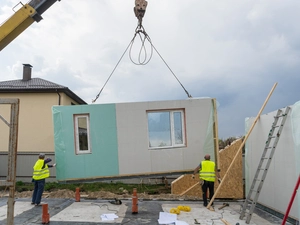Trade Roles
We employ and support Trade apprentices. Our apprentices learn at college and gain vital workplace experience on industry placements in the Construction industry and wider Built Environment
Key skills we look for – Able to work well with hands / Adaptable to change / Analytical / Attention to detail / Collaborative / Calm under pressure / Environmental awareness / Health & safety awareness / Interpersonal / Teamplayer / Verbal communication.
Discover more about apprenticeships and careers on our Why Construction? page. And please contact us with any enquiries.
Our core offer includes:

Bricklaying
Bricklayer
- Level 2 Apprenticeship – Bricklayer
- Published duration – 30 months (plus End Point Assessment).
- On completion – you may be eligible to apply for the Skilled Worker – Blue – CSCS Card.

Carpentry
Carpenter
- Level 2 Apprenticeship – Carpentry and Joinery
- Published duration – 24 months (plus End Point Assessment).
- On completion – you may be eligible to apply for the Skilled Worker – Blue – CSCS Card.

Be An Apprentice
Advanced Site Carpentry (Level 3)
- Level 3 – Craft Carpentry and Joinery
- Published duration – 15 months (plus End Point Assessment).
- Entry requirements – Level 2 Carpentry & Joinery Apprenticeship.
- On completion – you may be eligible to apply for the Advanced Craft – Gold – CSCS Card.
 Construction Assembly and Installation Operative
Construction Assembly and Installation Operative
- Level 2 Apprenticeship – Construction Assembly and Installation Operative
- Published duration – 18 months (plus End Point Assessment)
- Assembling and installing modular and portable buildings manufactured off site.
- On completion – you may be eligible to apply for the Skilled Worker – Blue – CSCS Card.

Plastering / Dry Lining
Dry Liner
- Level 2 Apprenticeship – Interior Systems Installer
- Published duration – 24 months (plus End Point Assessment).
- On completion – you may be eligible to apply for the Skilled Worker – Blue – CSCS Card.

Groundworks
Groundworker
- Level 2 Apprenticeship – Groundworker
- Published duration – 18 months (plus End Point Assessment).
- On completion – you may be eligible to apply for the Skilled Worker – Blue – CSCS Card.

Painting & Decorating
Painter and Decorator
- Level 2 Apprenticeship – Painter and Decorator
- Published duration – 36 months (plus End Point Assessment).
- On completion – you may be eligible to apply for the Advanced Craft – Gold – CSCS Card.

Plastering / Dry Lining
Plasterer
- Level 2 Apprenticeship – Plasterer
- Published duration – 36 months (plus End Point Assessment).
- On completion – you may be eligible to apply for the Advanced Craft – Gold – CSCS Card.
 Property Maintenance (multi-skilled)
Property Maintenance (multi-skilled)
- Level 2 Apprenticeship – Property Maintenance Operative
- Published duration – 24 months (plus End Point Assessment).
- On completion – you may be eligible to apply for the Skilled Worker – Blue – CSCS Card
More information
- Future Careers– Read more on our Why Construction? page
- Apprenticeship Training – Most training is on day-release to college in term-time, but colleges sometimes deliver apprenticeship training on a block-release basis. This means the apprentice will be staying away from home for a few days, but the accommodation is usually provided by the college, and we take care to ensure that under 18s are only placed in secure lodgings. We also pay our apprentices to go to college, we cover travel costs and, if necessary, accommodation when staying away.
- Prior Learning – Where an apprentice has previously completed a relevant diploma or apprenticeship, the college may decide they have sufficient knowledge to undertake their apprenticeship in less time. This will be assessed at the outset.
- Gateway– This is the point when an apprentice is deemed ready to start their End Point Assessment (EPA), having completed their mandatory training (at college), their maths and English (if required), and achieved any specified qualifications (e.g., HNC). The decision to have reached Gateway is made by Shared Apprenticeships (employer) in discussion with the college and by the nominated End Point Assessment Organisation (EPAO). Only apprentices who have reached Gateway can progress to their End-Point Assessment.
- End-Point Assessment (EPA)– This is an impartial assessment which takes place over a period of weeks and months towards the end of an apprenticeship. EPAs can vary, but typically include an observation in the workplace, practical and written tests, a project, a presentation, and an interview. The EPA is an independent assessment to prove whether the apprentice is occupationally competent and able to demonstrate the duties, knowledge, skills, and behaviours (KSBs) set out in the Apprenticeship Standard. All apprentices must pass their EPA to complete their apprenticeship. Read more here.
- End-Point Assessment Plan (EPAP) – This describes how the apprentice should be assessed – e.g., a practical test; a project; a multiple choice test. We work with the host company, college and professional body where relevant to ensure that our apprentices have time to prepare.
- End-Point Assessment Organisation (EPAO)– End-Point Assessment Organisations (EPAOs) are independent bodies which conduct EPAs. They are separate from the employer and training provider to ensure that the EPA remains impartial. EPAOs ensure that all apprentices following the same Apprenticeship Standard are assessed consistently.
- Completion Certificate – Once all elements of the apprenticeship and EPA have been completed, the apprentice will receive an apprenticeship certificate. For some apprentices, passing their EPA and completing the apprenticeship may also lead to letters after their name and professional recognition from an authorised body.

